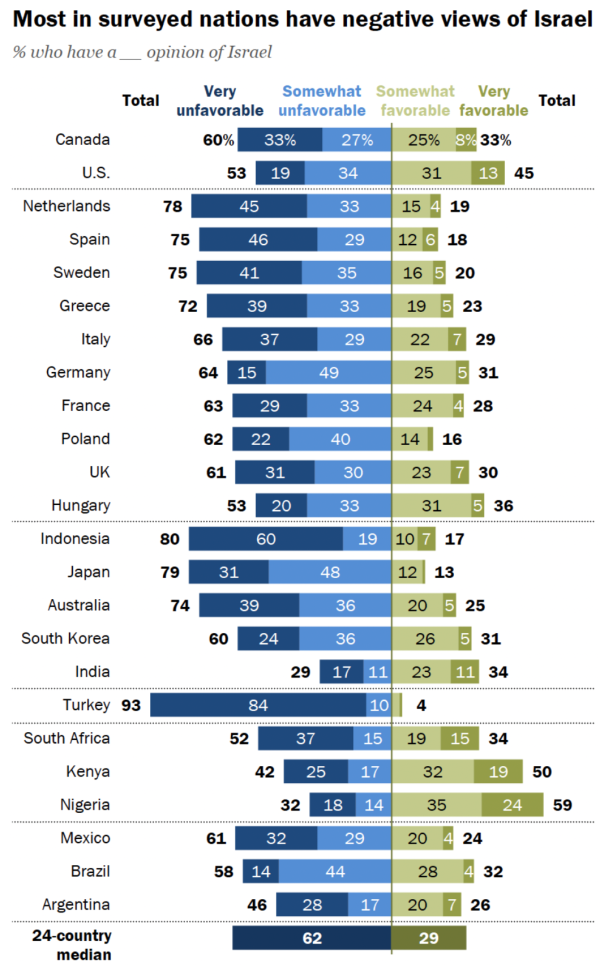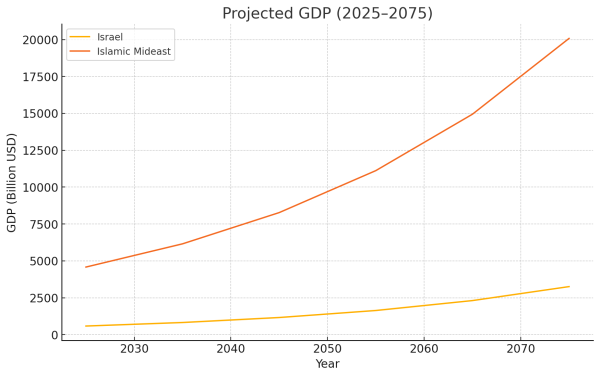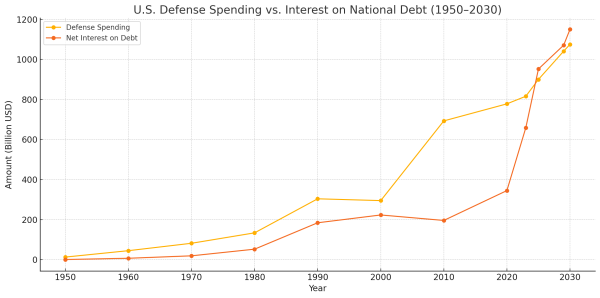The fog of war is thick over the current hostilities between Israel and Iran, but the intense interest in short-term outcomes of this regional war may be obscuring the ultimate prospects for Israel as negative trends undermine its militaristic foreign policy. I will describe these trends and the likely outcome.
Loss of International Support
The cruel irony of a state born out of the holocaust of the European Jews ruthlessly inflicting death and destruction on Palestinians in Gaza is turning world opinion against Israel. The vast destruction and indiscriminate killing in Gaza has indelibly stained Israel’s reputation. Surveys indicate substantial worldwide deterioration of support for Israel. Public outrage is translating into diminished political support from governments. Votes against Israel in the UN are increasingly lopsided, with only the U.S. Security Council veto sparing Israel from adverse SC resolutions. While the majority of Israelis continue to support the brutal destruction of Gaza, Israeli leaders stand accused of war crimes by the International Criminal Court.
Gaza destroyed – The whole world is watching

2025 Pew Survey
As international opinion turns against Israel, the pressure for boycotts, divestment, and sanctions (BDS) will grow, likely following a scenario similar to the economic campaign against the South African apartheid regime.
Internal Political Divisions
Although the current hostilities have rallied Israelis behind the government, Israeli society is sharply divided along multiple lines that shape its politics and national identity. Key divisions include:
Ideological: A dominant right-wing bloc favors nationalism, settlements, and judicial limits, while a weaker left-wing supports civil liberties and a two-state solution.
Religious: Secular Jews clash with religious and ultra-Orthodox communities over military service, education, and the role of Jewish law in public life.
Ethnic: Ashkenazi Jews (European descent) and Mizrahi Jews (Middle Eastern/North African descent) differ historically in status and voting patterns.
Jewish-Arab: Arab citizens face systemic inequality and are often excluded from national identity and governance debates.
Judicial Crisis: Deep polarization emerged over judicial reform, with mass protests defending democratic institutions.
Geographic: Urban centers lean liberal; peripheral towns and settlements are more conservative and religious.
These divisions contribute to political instability, fragmented coalitions, and growing tensions over Israel’s democratic and Jewish character. As strategic consensus erodes and public trust in leadership falters, especially among reservists and young secular Israelis, Israel’s willingness to use force may become more selective, contested, or politically risky.
Before the attack on Iran, Netanyahu’s ruling coalition was teetering on the edge of collapse over the issue of conscription of Orthodox religious men. Massive demonstrations have regularly occurred opposing the government’s legislative attempts to limit the powers of Israel’s judiciary, and there have also been continuing large demonstrations against the fighting in Gaza. Many reservists have refused orders to return to duty because of their opposition to the conduct of the Gaza war. Thus, it is likely that the turbulent conditions in Israeli domestic politics will worsen in the future.
Shifting Military Power Balance
Military power depends on economic power. The Islamic nations of the Mideast are collectively much richer in natural and human resources than Israel. This disparity will persist and grow in future decades, irrespective of political divisions and frictions among the Islamic nations. The growing wealth of Israel’s adversaries will likely enable the development of arsenals of advanced weaponry capable of overwhelming Israel’s defenses.
Military analysts have written extensively about the superior performance of Israel in wars against its neighbors (e.g., Why Arabs Lose Wars), and they attribute much of this advantage to human factors, such as training, unit cohesion, and patriotic fervor. However, as weaponry becomes more sophisticated, human factors diminish as a determinant of victory. The current long-range fighting between Israel and Iran involves no maneuvering or close combat of soldiers. It is a battle between offensive and defensive missiles and aircraft.
It is instructive to consider the history of the wars fought between Armenia and Azerbaijan in the context of the conflicts between Israel and its neighbors. Like the Jews of Israel, the Armenians were victims of a holocaust, have a large diaspora, and sought to recover ancient lands from an Islamic neighbor. Armenia was victorious in a war fought from 1988 to 1994 and took the Nagorno-Karabakh region from Azerbaijan, despite Azerbaijan having twice the population and GDP. Ten years later, in 2023, Azerbaijan defeated Armenia using a new arsenal of advanced weapons, including Turkish drones, and recovered Nagorno-Karabakh. The lesson is that a nation with qualitatively superior military personnel can be defeated by an adversary with quantitatively and qualitatively superior weaponry.
Iran has already demonstrated the ability of its hypersonic missiles to penetrate the best Israeli missile defenses. In a numbers game pitting attacking against defending missiles, the larger and better arsenal wins. In the future, Israel will likely face steadily growing numbers of offensive missiles in Turkiye, Egypt, Saudi Arabia, and again in Iran. The greater wealth of Israel’s regional adversaries will eventually translate into large arsenals of smart weapons that offset Israel’s personnel quality advantages.
U.S. Imperial Decline
The size and scope of the U.S. military establishment is no longer easily sustainable by the U.S. economy. Annual interest on the U.S. debt now exceeds the size of the defense budget, and domestic political pressure is growing to curb U.S. overseas military commitments. Meanwhile, the U.S. is faced with a challenges from China’s rapidly expanding military capabilities and Russia’s reassertion of military power in Ukraine. These economic and geopolitical factors will increasingly limit the resources available to support Israel.
Apart from economic and political constraints, the increasing internal dysfunction of the U.S. military-industrial-complex is causing a steady decline in military capability. The U.S. is falling behind its rivals in the areas of hypersonic missiles, drone warfare, and naval shipbuilding. Defense projects are often poorly conceived, exceed budgets, and miss schedule milestones. The misaligned incentives of defense contractors and normalized corruption of procurement officials is seriously weakening the U.S. military. The U.S. failure to prevail against insurgents in Afghanistan and the growing evidence of a failed proxy war against Russia in Ukraine indicate the diminishing ability of the U.S. military to accomplish strategic objectives. These trends call into question how much longer Israel can expect sufficient military support from the U.S.
Conclusion
The U.S. may intervene to enable Israel to win the current war against Iran and compel Iran to accept harsh restrictions on its nuclear program and military capabilities. This will not alter the economic, military, and political trends working against Israel’s current political model of a militarized ethno-state. As the global power of the U.S. declines, its ability to support its main outpost in the Mideast will wane. This, together with internal political pressures, increasing international economic sanctions, and the growing costs of permanent regional military confrontation will result in Israel ultimately becoming a largely secular democratic nation at peace with its neighbors. This outcome for Israel may be delayed for many years, but I believe it to be inevitable. Israel cannot long persist in behaving like a ruthless warring kingdom of the biblical era.



























